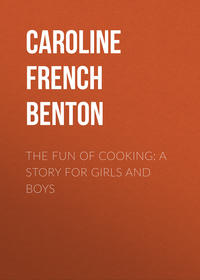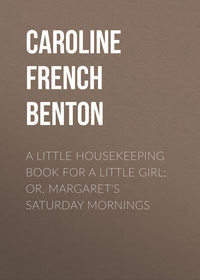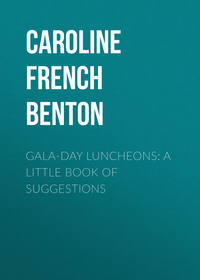 полная версия
полная версияLiving on a Little
So Dolly read and wrote out:
"'Get firm, large berries, and stem but do not wash them. Weigh three-quarters of a pound of sugar to each pound of fruit, and arrange them in layers in your kettle; cover and let them stand all night (or if the weather is very hot and damp, do this in the early morning and cook them toward night). The next morning put the kettle on and bring the berries slowly to the boiling point and skim them. Simmer exactly fifteen minutes and take the kettle off the fire; cover it with a thin cloth and let it stand all night without moving. In the morning heat again, and skim; this time let it simmer exactly ten minutes and take off the kettle; drain off the juice and boil down for just five minutes, put the berries in, and put them in the cans and seal.' That's a queer rule," Dolly commented as she finished.
"It's perfectly splendid, and we will follow it to the letter and you shall see for yourself. Now remember this important thing that I am about to tell you, for it is something you must never lose sight of when you do up fruit: the reason why any fruit spoils, when you put it in good, air-tight cans, is that you have not sterilized the cans and covers, and have not used new rubbers each year."
"But just how do you sterilize cans?"
"Wash them, and then put them in the oven, tops and all, and bake them half an hour. Put the rubbers in hot water for fifteen minutes and wipe them dry. And always use glass cans with glass tops fastened on with wires. When you put the fruit away, find a place for it in a cool, rather dark closet. If you do all these things, none of it will ever 'turn' or spoil."
"Well, I'll impress it all on my mind. Now tell me what we are going to do up this summer, and all about it."
"Currants come first. I shall make jelly of some of those, and later on we will spice them and make conserve, and mix some with raspberries for another sort of jam."
"Does your jelly always 'jell?'"
"Always. It has to, whether it wants to or not. Most jellies are perfectly easy to make, so you can follow a good cook-book; currant jelly is the only sort you could ever have any trouble with, and that you need not have if you follow this rule. Write down:
"'Currant Jelly That Never Fails. Take currants that are barely ripe, and do not pick them just after a rain, when the juice is thin. Do not stem them or wash them, but look them over carefully and crush them in a crock with a wooden potato masher. Put them in a bag, and hang them up and let them drain all night. In the morning measure the juice and take just as much sugar, with the addition of one extra half-pint at the end; put this in the oven to heat. Put the juice on the fire and boil it twenty minutes, skimming it occasionally; then put in the hot sugar and stir till this is dissolved. Let it boil up hard just once, and take it from the fire immediately, for the jelly has come; longer boiling will prevent its ever setting. Pour it into glasses and put it in the sunshine for two days, then cover with paraffin and put it away. This is perfectly clear and of a fine flavor.'"
"So it is," Mrs. Thorne added, as Dolly copied the last words. "Next let us make a sort of list of what you can put up when you are where you can get fruits cheaply in summer. When you are in town you cannot well do them by the wholesale, but a glass or a can when you can find something reasonable, such as a box of nice berries one day, and a quart of nicer plums the next, and so on."
"Like winter preserves," said Dolly.
"Exactly. But now, as we happen to be in clover this summer, we must do up a lot of things. I have learned to alternate the fruits, one year doing one kind and the next leaving that sort out and taking another, for variety's sake; but as you are going to divide all the fruit with me this year and have half for your very own, we must do up heaps and piles of everything. I will tell you what we can make if we choose."
Dolly took her pencil again, and her sister gave her this list: "Take strawberries first; those you preserve and also make into jam. Then come cherries; like the strawberries, you use the Danish rule, taking less sugar if they are sweet, or the usual amount if they are sour. You can make spiced cherries to eat with meats, too; those are lovely. Currants you make into jelly, of course; to my mind it is the best kind of all. Then you spice them also, and make currant conserve, which is a mixture of currants, raisins and oranges, and awfully good. You also mix them with red raspberries for jam, and if you like, you make raspberry and currant jelly too. Raspberries you do up by the Danish rule, using the smaller amount of sugar, as they are sweet. Raspberry jam is very nice for a good many things, and I usually do up a good deal of that.
"Then come gooseberries; those you make into jam to eat with cream cheese – home-made Bar-le-Duc, you know. And you spice them exactly as you do currants. All those rules are in your cook-book.
"Pineapples you can with a good deal of sugar. Blackberries you can make into jam and jelly, and you can also can them, but to my mind they are pretty seedy except in jelly, and that is rather dark colored, not as pretty as most jellies. Still, all things are good for a change. Blueberries or huckleberries I can for tarts in winter.
"Then melons come on, and you can make watermelon sweet pickles, and also citron preserves. Plums come, too, about this time, and those you merely can, making them as sweet as you like. I put up greengages and purple plums in quantities, and use them for deep tarts in winter, saving eggs, you see, in my desserts. And I also make plum jelly and spiced plums, if I can get them at a cheap price.
"Peaches are your best preserve. I can them in a rather rich syrup, leaving them whole and putting in a good many kernels from their stones. Buy those carefully, for they are usually expensive. The bits left over I make into peach jam; it is the best thing for little tarts and to use with whipped cream in different ways. And of course I make spiced peaches, too. Pears I can, and I make pear conserve, out of pears, lemon and ginger-root; that is very good with cream cheese and crackers for lunch.
"Quinces I use in jelly, sometimes mixing apples with it, as it is apt to be a little high flavored. I also do up a few cans of preserves, and once in awhile I make a lovely conserve of quince, grapefruit and a few oranges; that I do later in the fall. Grapes I make into jelly, and I spice a lot, too. I make a marmalade with the skins and pulp and sugar, all boiled down together; and grape conserve, made of grape pulp and oranges and raisins, is one of my choicest things. Citron you preserve; it looks exactly like pineapple.
"By this time crab-apples come, and I spice some of those, and make a good deal of jelly, it is so clear and pretty. By the way, because your cook-book will not mention the fact, remember always to put half a lemon, cut up with its peel, into each kettle of hot jelly as you take it off the fire; just stir it in and leave it while you dip out the jelly. It gives a delicious flavor. And when you want geranium jelly, drop in three of four leaves of rose geranium with the lemon at the same time; you can bruise them a little if you like. Spiced crab-apple jelly is nice, too; you just add a bag of whole spices as it cooks. You see what a lot of things there are, and I am sure I could think up others if I tried. But probably you will learn more for yourself as you keep house, because every cook is experimenting nowadays, and you constantly hear of new things."
"I am sure I shall love to do up fruit; it looks so pretty when it is in the glass, and you feel so rich when you see it on your shelves."
"The worst of it is that it is the poetry of cooking, and all housekeepers love to do it up, love it not wisely but too well. They buy when they ought not, and put too much money in both fruit and sugar. Often they have to keep a lot over from year to year, which is not at all a good idea. So be on your guard and do not rashly buy and do up everything in sight every summer. Of course this one year, when we are economizing so in vegetables and milk, we can afford to spend more than usual in other things. Then, too, most of the fruit is right in our own garden, which is a wonderful stroke of good fortune and probably will not come our way twice. And I brought out that barrel of cans and glasses from town, so we shall not have to buy as many as we would otherwise; we shall have to buy some dozens, however, I am afraid."
"Don't you think we ought to do up some fruit for Aunt Maria, Mary?"
"Indeed I do. I am not sure whether she will like the idea, – though I hope she will like the fruit, – but I think we had better get out her own cans and fill them with the old-fashioned things she will be apt to enjoy, such as cherries and strawberries and quinces and watermelon rind. It will be fun to leave her some things, and goodness knows we ought to, after all we have had out of her garden."
"Do you ever do up vegetables?"
"I seldom have done that, but we must this year. We will do up some peas and corn and succotash, and string-beans and tomatoes, anyway."
"I thought vegetables didn't keep well if you did them up yourself."
"Get a good rule to begin with; you can get a perfect one by sending to Washington to the Bureau of Agriculture. Then sterilize your cans, and you won't have a bit of trouble. Spoiling used to be the bane of a housekeeper, for five times out of ten things would sour, and she could not tell what was the matter; but sterilize the cans, and you will be all right."
"And do you think you save a lot by doing up vegetables?"
"Of course you do – heaps of money; you can see how that is at a glance; and they are so much better than what you buy, too. Tomatoes I just peel and salt a little, and put in cans and stand them in a cold oven; then I make a fire and leave them till the tomatoes boil. I keep one extra canful ready to fill up the others from as I take them out, because they shrink a little as they cook; then I put on the covers. They come out six months later just as though they had just been gathered. You see how easy that is, especially as you scald the tomatoes instead of taking off the skin with a knife, as you do with fruits. String beans and peas I can so you would not know them from fresh ones. I pick them over and put them on in cold water and simmer them fifteen minutes; then I drain and measure them; to a quart of either I put in one level teaspoonful of salt and one of sugar, and to each four quarts one of soda; then I put them back in the kettle, just cover them with hot water, cook five minutes and can them in glass jars."
"Oh, Mary, that reminds me – pickles! You haven't said a word about those."
"To be sure. Well, I do up few of those, because we like sweet pickles made from fruit better than sour ones of vegetables; but you can make some tiny little cucumber pickles if you like, and chow chow, and chili sauce, and a sort of mince made of green tomatoes and cabbage and all sorts of things. You can study up on pickles, later on, and ask people who like to do them up about recipes, and decide, as time goes on, what you want. We have undertaken so much this summer that, except for chili sauce and a few jars of other things, I do not think we shall do much in the pickle line. Pickles are really not economical, because they do not serve as a food, as fruit and jellies and jams do; they are only a relish, after all. Still, they help out, especially at luncheon, so put up some when you keep house, by all means."
Picking over the strawberries and starting the process of preserving them, making up jam out of the smaller and poorer berries, and a hurried trip down town for more sugar, together with getting lunch and cleaning up the kitchen after all the work was done, consumed most of the day. It was not until toward night that Mrs. Thorne began to make preparations for dinner, and then she found that the beef left by the butcher had evidently not been kept in the ice-house, but had been exposed on the counter, and it had a distinct odor which was anything but pleasant.
"No wonder he drove off in such haste after he gave me the bundle," said Dolly indignantly. "Whatever shall we do, now, Mary? Go down-town for more?"
"No, it's much too hot, and we are too tired. We shall have a supper of some kind. Let me see; what can we have? I'm really too used up to think."
"Iced tea for one thing; that is made and ready, at least. But the kerosene-stove has got to be filled before we can cook anything, for the oil gave out just as we finished the last strawberry."
Mary looked apprehensive. "It did? My dear, that was the last drop in the house, and they won't deliver anything after four o'clock. And there's not a single stick of wood sawed, either, for that miserable boy, who promised to come back after handing in the berries, has never appeared at all."
"What will you do? Dick is sure to come home ravenous."
"There's the chafing-dish, blessings on it! And the alcohol bottle is full; even if all the other fuels have given out, that remains. We will stir up something in that and have a salad. Always have a chafing-dish, Dolly; there are times when life would not be worth living without it."
The emergency shelf of the pantry yielded a can of salmon, and this was drained and the bones removed, and a white sauce made for it in one of the pans of the dish. It was to be reheated and the fish put in it in the chafing-dish on the table. With this was to be bread and butter and iced tea.
"For a salad, Dolly, get those string-beans I cooked and set away this morning. Put them on lettuce and add French dressing; that will be very nice. For dessert I meant to have strawberries, but the very idea of them is nauseating after working with them all day."
"I should rather think so – strawberries, indeed! No, for once I am going over to neighbor Thomas' and borrow; that is the proper thing to do in the country, and I dare say they have felt slighted that we have not been before. Probably they think we are proud. I know they have more cream from that Jersey cow than they can possibly use, and I have an idea of a dessert I can make up all alone. Mary, do you think we shall ever be able to have a real live cow of our very own?"
"If we were going to live in the country the year around, I think somehow or other we ought to manage to have one. We should have to pay for hay and things in winter to feed it on, and get somebody to milk it, though, and I remember to have heard that caring for the milk was no small consideration when one has a small family. I rather think, when you counted up the first cost of a good cow and added the price of its care and food, you would find it was cheaper to buy milk; but wouldn't it be perfectly delightful never to have to economize on it? Think of the cream soups and ice-cream and custards and fresh cream cheese and everything else! Well, Dolly, dear, run along on your errand, for if we continue this subject you will see me dissolve in tears."
Their neighbor proved to have a bowl of cream she did not need and was glad to let Dolly have, and in a moment the cream-whipper was at work, and presently a mass of stiff whip was ready, sweetened, flavored and laid lightly on a cold glass dish. Then going to the pantry, a small paper box was found among the cracker boxes sent from town. This was full of lady-fingers. Half of it was used for the dessert, as they were split and arranged around the cream, and there was a most delicious mould of charlotte russe. As half the five-cent box of cakes was left over, this cost but a veritable song, thanks to the neighbor's kindness, which, by the way, was repaid later on by the gift of a strawberry shortcake.
Mary was getting the chafing-dish ready to light for the second time the moment the latch of the garden gate announced her husband's home-coming. Meanwhile she gave Dolly a talk on its uses.
"Always have a chafing-dish in the house," she began seriously. "When you need it at all, you need it dreadfully. Now, in a place like this, where you may be caught unawares at any moment with no fuel, you can see that we simply could not do without it. Of course in town we have the gas-stove, and that cooks just as well as this, but even there a chafing-dish is a good thing to own. On Sunday night, for supper, it is more fun to cook with this than it is to stir up things in the kitchen. Then, too, when you have people in during the evening, it is nice to have them sit around the table and chat while you get up a little supper with it. You can have so many good things in it, too, such as lobster, creamed or Newburg, and scrambled eggs mixed with green peppers or tomatoes, or creamed haddie, or cheese fondu or rarebit. And with sandwiches and coffee and salad, you can see you can have a really beautiful supper, the coffee in the machine on the sideboard or on one end of the table, the salad ready in its bowl, and the chafing-dish and hot plates in front of the hostess."
"Yes, of course it is fun to use one. I know lots of girls who make a regular business of learning how to make new things; they take cooking lessons on them."
"I know they do, but sometimes I am inclined to think they overdo that matter. You should not take a chafing-dish too seriously, in my opinion. It is invaluable in an emergency, and good at other times, but after all it is better to learn to cook on a range, and make all sorts of things, and then you can easily add on the chafing-dish cookery. In other words, it is an informal utensil for informal occasions, not for every-day use."
"Well, certainly to-night we needed it badly enough, and if Dick declines to saw wood this evening, as my prophetic soul says he will, we shall have to get breakfast on it too. What will you have?"
"Let me see. Are there plenty of eggs? I think we will scramble some, or, if we are short, we will cream codfish in the dish. The coffee I shall make in one of the two pans, too, since our machine is in town. Toast we can't have, and muffins are equally out of the question, but we will have berries, and bread and butter, and then our nice hot dish and coffee. That's a meal fit for anybody."
"And 'no trouble at all,'" quoted Dolly.
CHAPTER XIII
Midsummer Housekeeping – The End of the Holiday
As summer went on the weather turned extremely hot, and the problem of keeping the little house cool and doing the work easily became a real study to the sisters. It was such a simple matter to allow the cooking to stretch itself out over so much of the morning that before they realized it they were tired out for the rest of the day.
In order to make things easier, they decided to rise a trifle earlier than usual, throw open all the doors and windows, and let the cool air in; then they would breakfast on the porch as usual, wash up the dishes, and set the house in order and close and darken it for the middle of the day. There would still be time to go down-town and market and do what cooking was necessary, and yet before noon everything would be out of the way. By careful planning they could manage the luncheons and dinner so that they could be ready in advance and the long afternoons could be devoted to rest and reading. Then between four and five o'clock the doors and windows were again thrown open. The dinner table was laid on the porch, just before the six o'clock train was due, and the dinner itself was put on in only a moment, thanks to the foresight of the morning.
One of the things upon which Mrs. Thorne laid great emphasis was the delightfulness of cold meals on hot days. When one rose jaded from a sultry night she felt it was not the time for codfish cakes or scrambled eggs. When luncheon was to be set out, things from the refrigerator were what one wished for, cold and comfortable. Even at dinner, the food on a blisteringly hot evening was cold; cold and appetizing, and quite as nourishing as though it had been heated.
They arranged these meals in this way: for breakfast, they cooked oatmeal or farina or some other cereal in the fireless stove all day, till it was a jelly; toward night they put this into a mould, cooled it, and then set it on the ice. In the morning they had first a pretty form of this cereal surrounded by red raspberries or sliced peaches, with sugar and cream; this, with toast and hot coffee, was all they wished for. Sometimes, when they tired of the cereal, they had a chilled salad of sliced tomatoes on lettuce, with a light French dressing, a curious breakfast dish, but one they found very refreshing in the heat.
On cooler mornings they had a first course of little melons, followed by eggs, muffins and coffee, or fried tomatoes in the place of the eggs.
For luncheon they had all sorts of things from the garden. Often the main dish was a vegetable salad, – string-beans or stuffed tomatoes, or cucumbers and tomatoes, – with freshly made cottage cheese bought from a neighbor, and bread and butter and iced tea, coffee or chocolate. Or, if the day was cool, they had the vegetable hot, – baked corn, or creamed peas, or tomatoes, baked, filled with crumbs and seasoning, – and for a second course there was usually fruit. Luncheons such as these were nothing to get up. The vegetables were prepared directly after breakfast. If they were to be served as salads, they were cooked, cooled and set on the ice; if hot, they were made all ready to put in the oven at the last moment.
Their cold dinners, however, were their pride. They found so many good things to have that they fairly hesitated which to choose for any particular night. Sometimes they began with clear soup. This, of course, was made the day before in the tireless stove, and only strained and put on ice the next morning for the second evening. On very hot days sometimes they put it in a small pail, and set this in another and larger one, with ice between, and put it back in the stove for the afternoon; then it came out full of splinters of ice, a most delightfully cool affair. Fruit soups they experimented with, but found they did not care for, so they clung to this clear bouillon when they had soup at all.
Usually, however, their dinner began with meat. This was made ready either the day before it was needed, or else it was prepared early in the morning. They had veal loaf sometimes, surrounded with sliced tomatoes and French dressing; or slices of cold mutton with peas in mayonnaise; or occasionally, as a treat, jellied chicken with the peas. Sometimes they had bits of lamb, cooked very tender with a knuckle-bone, and then made exactly like the jellied chicken, the meat turning out set in an aspic. Often peas were mixed with the lamb in the mould, and then a little gelatine was added to ensure its setting firmly. Usually, with the dish, they had dressed lettuce.
After this combination course of meat and salad, came dessert. They often had an ice or sherbet made from the fruit in the garden, costing nothing but the small amount of sugar used in making it and the ice used in freezing. This was alternated with some sort of mousse made in the fireless stove. Sometimes there was fruit jelly, raspberries, possibly, set with lemon jelly, moulded in a circle with whipped cream in the middle. Or there would be a chilled rice pudding; or peaches, cut up, sugared, and put in a pail with ice around them and set away till they were half frozen. These things, too, could all be prepared early in the day.
Usually, even when the weather was hot, the one exception to the cold-food rule was the coffee, which they liked best hot at night as well as morning, but when they had had any mousse or ice-cream for dinner, part of this was sometimes saved, and late in the evening there came in tall glasses of iced coffee or chocolate with a spoonful of the cream in the bottom of each; a sort of ice-cream-soda they particularly fancied.
When the weather grew cooler these cold dinners gave way to hot ones. Then they had cream soups first, made with any vegetable they happened to have ready cooked from the night before; a spoonful of spinach, or a handful of beans, or the outer leaves of lettuce, all were used. Afterward came meat and vegetables, and then perhaps a berry tart or a custard or shortcake. However, whatever they had, they were certain to prepare it to the last possible spoonful in the morning.
The meat course at dinner was too often a problem, for the butcher continued all summer to exercise them in the virtue of patience. In the early part of their stay his shop was so far from sanitarily clean that they were obliged to tell him they could not trade with him unless he improved his ways. This he good-naturedly consented to do as far as in him lay. He put his meat in the ice-box instead of leaving it exposed on the counter; what there was out he covered with a mosquito-netting. But as his ice-box was small, this meant that the meat could not hang long enough to make it tender; it was brought in one day by the farmers and put out for sale the next. All the beef was tough and stringy; the veal was apt to be far too young, and the chickens far too old. There was seldom any lamb to be had, and the mutton often had a curious flavor decidedly suggestive of wool.





